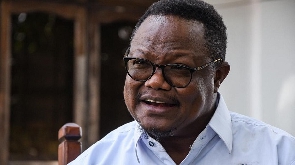l will emphatically say that,l am disappointed with some of the media houses which made the publication on the story,"Ghana FA Ranked Among the most corrupt FA's in the world by Transparency international."
Everything about the story is a hoax,and l never thought the media station which first broke the news would stood that low for cheap attention and popularity.How come at this modern and technological age,a cheap and stomach journalist would edit a story from its source and turn it as an insult for the sake of hatred.
What kind of journalism are we practicing in this country,just to make the FA unpopular, a cheap media house,gazettaghana,has defamed the Ghana football Association from a publication which meaning and its purpose has nothing to do with the FA being corrupt.l would like to add the true nature of the said publication from the Fifa's transparency international football
governance league table, for the readers to know how fake and cheap some of our journalist are.The publication from fifa did not specified any country of corruption,just ranking report of those countries that have not submitted certain financial reports but for the hate of Nyantakyi and his administration, some of the so called journalist in this country want him to be unpopular.This is how Fifa accounted their publication without specifically accusing any country of corruption."The corruption crisis at FIFA, world football's governing body, has shown how badly the sport is run
from the top. A lack of transparency and accountability allegedly led to what the United States
Justice Department has called systemic corruption resulting in charges of money laundering, bribery
and racketeering. The organization is now the subject of criminal investigations in the US and
Switzerland.
This lack of transparency and accountability is unfortunately not limited to FIFA's headquarters.
FIFA does not systematically require transparency and accountability from its members, the national
football associations (FAs) and the regional confederations. Any reform of FIFA will have to make
that a priority.
Each year FIFA hands out millions of dollars to FAs. The money is generated from two main
sources: sponsors and broadcasters. They pay FIFA money because billions of fans follow football,
watch it on TV, and buy football products such as balls and kits. It is the positive association with
football that sponsors value and the global reach of the World Cup they pay for. The FAs generate
additional revenues from local sponsorship deals, government grants and ticket sales.
We believe fans have a right to know how the money FAs generate through their interest in football
is spent, as does the general public because governments also invest tax payers money in football
at the national level. We believe greater transparency lessens the corruption risks.
FIFA, as the custodian of the World Cup brand and the governing body of world football has an
obligation to operate to the highest standards. The global reaction to the corruption crisis at FIFA
with fans, governments and sponsors speaking out against the organization, is testament to how
important it is to have a well-run and well-respected organization in charge of the world's favorite
game.
What we see now are FIFA executives arrested and charged with financial crimes. That is why FIFA
has been nominated in Transparency International's Unmask the Corrupt.com campaign to identify
the most symbolic cases of corruption the world.
To identify potential corruption risks in world football, Transparency International looked at the
information that is publicly available on websites about how the 209 FAs and the regional football
confederations are run. Do they publish financial accounts and report on their activities? Do they
have statutes and codes of conduct? Most do not. We set the bar for transparency at a very low
level. Even FAs with a top score still need to reveal much more to the public about their organization
and how they spend the cash that pours in from FIFA headquarters and their own revenue
generating activities.
The results show just how necessary it is for world football to be reformed from the bottom up as
well as from the top down.Between 2011 and 2014 FIFA distributed a minimum of US$2.05 million to each of its 209 member
football associations (FAs). This included a one-off payment in 2014 of US$1.05 million following the
success of the World Cup. During that same period FIFA also gave US$102 million to the six
regional football Confederations.
FIFA says the money is for football development. But other than a partial accounting on the FIFA
web site, there is no clear way to track what the FAs did with all that money.
? 81 per cent of FAs have no financial records publicly available
? 21 per cent of FAs have no websites
? 85 per cent of FAs publish no activity accounts of what they do
Transparency International looked for what information is publicly available on the websites of the
activities and expenditures of the 209 FAs and six regional Confederations. We wanted to find out
how transparent they are about the money they receive from FIFA and their other revenues.
Many of the FAs and the confederations have income from sponsors, broadcasting licenses, ticket
sales, international matches and other sources in addition to the funds for FIFA. While they
prominently display the logos of their sponsors on their homepages, little to no information is
provided on the value of these deals and activities.
We also sent emails to all 209 FAs asking them for links to the information because many websites
are hard to navigate and the information hard to find1.
Only fourteen out of FIFA's 209 football associations – Canada, Denmark, England,
Hungary, Iceland, Italy, Japan, Latvia, New Zealand, Northern Ireland, Norway,
Portugal, the Republic of Ireland and Sweden – publish the minimum amount of
information necessary to let people know what they do, how they spend their money
and what values they believe in.
While FIFA publishes on its website some details of how its members spend the development funds
it gives them, it demands no public accountability from the organizations themselves. It was only in
2014 that FIFA asked for written, audited accounts for its own use. Some of these can be found on
the FIFA website. According to FIFA, not all member associations complied by the March 2015
deadline and any further financial assistance payments will not be paid until they do.
In some countries, national laws prescribe what football associations need to publish. These vary
from country to country and many do not require significant public disclosure. Nevertheless, we
believe that publishing this information is an important part of good governance.Transparency International looked at the publicly available information on the websites of FIFA's 209
member associations (FAs) and the six regional confederations (which are not members of FIFA,
but receive funding from it).
We divided the information into four categories that represent basic information that should be
available for organisations in order to monitor their governance and standards: financial accounts,
codes of conduct, charters/statutes and information on activities. We gave one point for each of the
four categories. The categories are derived from the Transparency International Business Principles
for Countering Bribery2.
The chart below shows that 42 per cent (87) of FIFA's member associations scored zero points.
That means they do not publish any relevant informatiTransparency International believes FAs and Confederations should make information publicly
available about their operations, finances and core values. If football organisations incorporate best
anti-corruption practices into how they operate they can begin to win back trust among fans, limit the
scope for bribery and corruption, and help in the fight against match-fixing.
Based on our experience in promoting good governance in the public and private sectors, our work
with FIFA over the past five years, and the most recent study on the public face of football, we
recommend:
1. FIFA should mandate through a change in its statutes that all its members must make
publicly available the following information as a pre-requisite for membership and financial
assistance: audited financial accounts, an annual activities report, code of conduct/ethics3
and organizational statutes. This should supersede national legal requirements if they are
less rigorous.
2. FIFA's Audit and Compliance Committee should develop minimum standards on the
content of charters, codes and reports, and should be tasked, through the Committee or a
subsidiary body, to monitor associations' fulfillment of these requirements on an annual
basis as a precondition to the disbursement of annual FIFA funds to associations.
3. The FIFA website should also collect and make easily accessible all charters and annual
activity and financial reports of associations on its main website.
4. The six regional football Confederations should commit to publishing the same level of
relevant operational information as the football associations on their websites, including
codes of conduct.
5. FAs and Confederations should have independent oversight on their boards, including non executive
directors, tasked to ensure the organizations adhere to basic standards of
transparency and accountability.Transparency International looked at how FAs account for their activities based on the information
publicly available on each FA's official website. We chose four basic areas of information drawn from
our work on the Business Principles for Countering Bribery in small and medium-sized enterprises
and Transparency in Corporate Reporting. These methodologies were developed to identify best
business practice for countering corruption.
Scoring was split into four categories, and a point was given for each of the following
? Financial accounts
? Organizational statutes or charter
? Annual activity report
? Code of conduct or ethics
For the purposes of this descriptive exercise, the quality of the information available was not
considered when scoring, e.g. no difference was made between financial accounts and audited
financial accounts.
Lists of committee members and organisms were not considered to be sufficient to merit a positive
score on the organizational statutes criteria. We looked for full governing statutes, charters or
constitutions of the organization. These should explain the structure of the organization, including
the position and power of the executive/legislative committees and oversight mechanisms.
All findings were cross-checked by at least one other researcher on the team. The results for each
country were sent to the respective FAs for confirmation. We received 39 responses:
? Some FAs responded that they have key documents but do not have the capacity to post
them online.
? The Egyptian FA updated its website to include three of the four documents requested.
? A number of FAs responded that their national laws do not require them to make the
information public. This adds further urgency to our recommendation that FIFA must require
this.
We believe that the information on the activities of the FAs should be easy to find.
Some FAs
provided us to links to web pages that were not clearly labelled. Transparency International has
made every effort to search the FA websites but it is possible that some documents were missed. If
this is the case, please contact fifa@transparency.org.on about their organizations. Forty-two FAs do
not even have websites or websites that work"
This is the whole report,Fifa has not categorically mention any country with confirmation that they are corrupt,it is about certain reports they want from their members and those members who have not tender them are marked red.The goal project at pram pram justifies the fact that,Nyantakyi doesn't misuse Fifa funds and the fact that just ended congress, auditors publicly came to read the FA's financial report too shows how transparent the FA is.
Raymond Agbonlahol Yeboah
Opinions of Wednesday, 25 November 2015
Columnist: Yeboah, Raymond














